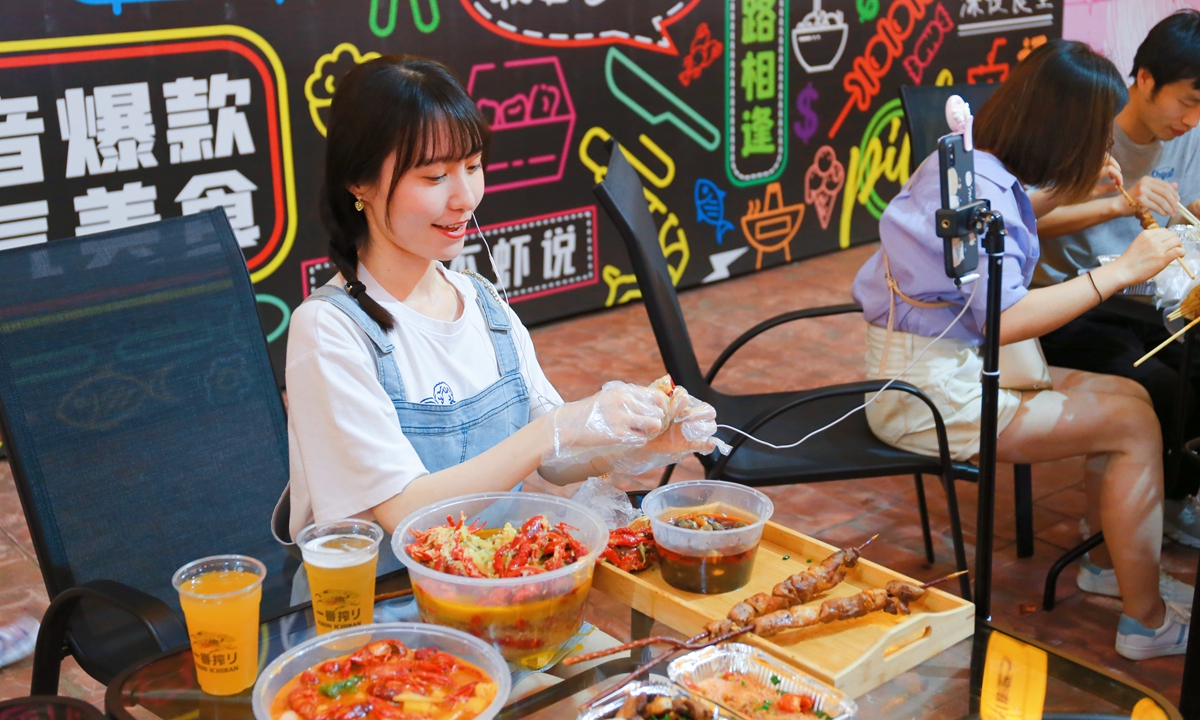NPC reviews draft law on food waste, banning popular eating show
By Zhang Han Source: Global Times Published: 2020/12/22 20:43:33
Far-sighted move doesn't imply immediate security problem

A female anchor of celebrity beauty in short video platform Douyin shares the delicious food with netizens while eating crayfish on June 6. The booming night market of Shanghai nightlife festival promoted the economy of eating show. Photo: IC
China's top legislature on Tuesday reviewed draft legislation against food waste in Beijing, which would ban popular eating shows and require governments above the county level to establish food banks.
It is the first time the draft was reviewed by the Standing Committee of the National People's Congress (NPC) after the proposed legislation was announced in August. The legislation is a crucial move as food waste tops 35 billion kilograms annually in China and about 12 percent of the nation's harvests go to waste along the entire production chain, China Central Television (CCTV) reported.
Experts noted legislation against food waste does not imply that China faces an immediate food security risk, but it is a far-sighted move of preparing for adversity in times of prosperity when global markets for grain and agricultural products face uncertainty.
The 32-article draft law stipulates that governments above the county level should establish food banks and encourage food producers to donate unsold edible food to people in need via social organizations and charities.
Livestreaming and other programs about excessive eating and drinking will be banned. Producers of such content will be ordered to rectify their behaviors and violators face a fine of 10,000 yuan ($1,526) to 100,000 yuan. This clause came as recently, to attract attention, some vloggers performed on short-video platforms pretending to be competitive eaters. Although they ordered large amounts of food, they left much uneaten and often vomited what they had consumed.
The draft also said restaurants should remind customers not to order too much by posting slogans or having waiters to do so. They should describe the size of each dish and offer a smaller portion as an option. Catering service providers are also allowed to charge for food waste if customers leave too much.
Governments should publish their anti-food waste work and state-owned companies should enhance regulations on catering for conferences and receptions, arranging food for the events properly.
Zheng Fengtian, a professor at Renmin University of China's School of Agricultural Economics and Rural Development, told the Global Times that China is "100 percent self-sufficient" in two main grains, rice and wheat, and is diversifying its food imports to guarantee stable supply.
But it is very important to make administrative and legal moves to tackle the problem amid the severe waste, and the legislation will guide the concrete efforts of governments, industries and consumers, the expert said.
Food is also wasted in production, storage and distribution due to technical problems, Zheng told the Global Times in an earlier interview.
CCTV reported on Tuesday that the NPC Standing Committee will also consider legislation on food security in 2021, which will contain regulations on food losses during processing, storage and circulation.
Wu Zidan, an agriculture expert at Jilin University, said that food waste is also a waste of precious water and land resources on which crops grow. The value of wasted food far exceeds its price.
"Good food consumption habits are not only for food security, but also a sign of social progress and civilization," Wu said.
Chinese top leaders in August called for enhancing public awareness of the food waste problem, cultivating thrifty habits in a national Clean Plate Campaign. A similar campaign was launched in 2013 that mainly targeted officials' extravagant feasts and receptions.
RELATED ARTICLES:
Posted in: SOCIETY